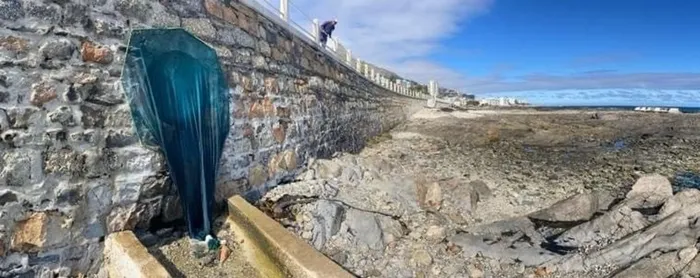Saving the seas from litter

A litter net catching rubbish.
Litter nets have been installed on the storm-water exits between Graafs Pool and the Sea Point swimming pools.
Ward 54 councillor Nicola Jowell said the amount of rubbish caught by the nets, which were installed last Wednesday, was unexpected.
The Atlantic Sun reported on litter in the sea last year (Renewed concerns about plastic litter in the ocean, November 11, 2021).
“The installation was done right before considerable rain fell so they were put to the maximum test and the amount of litter trapped was more than what was anticipated. A lot of the litter on the beaches is washed up from the ocean but this gives a very good indication of how much is coming off the roads via the storm water channels,” said Ms Jowell.
According to Ms Jowell, the nets were first tested over a year ago by the City of Cape Town's coastal management department, Shark Spotters, and the Pristine Earth Collective.
“The net was a success but it also proved to not be a simple project. Each storm-water outlet is a different shape, size and has its own unique challenges so a one-size-fits-all approach is not possible. The nets have to be accessible and this can be challenging in some coastal locations,” she said.
She said Pristine Earth Collective's role is essential since they will empty the nets and have two individuals cleaning the Sea Point beach four days a week.
“The emptying of the nets is essential so they are not damaged by carrying heavy loads.
“Hopefully this project will be a success and then the intention is to look how it can be rolled out in other locations too,” said Ms Jowell.
Eddie Andrews, deputy mayor and mayoral committee member for spatial planning and environment, agreed that the project may be expanded to other regions along the city's shoreline.
“I was very encouraged to see that these nets have been very successful in trapping the very small pieces of litter as well. We hope that these litter nets will be a visual reminder and create awareness of the significant challenge that plastic and litter present,” Mr Andrews said.
“The project has also created some basic employment opportunities for the removal of the litter from the nets and adjacent beaches. The intention is to separate recyclables from non-recyclables in the litter nets, and to recycle wherever possible,” he said.
George van der Schyff, the director of Pristine Earth Collective, says there are discussions about expanding from Bantry Bay to Three Anchor Bay/Green Point as well as Hout Bay.
“These nets can catch up to 7-10kg of litter per day, this is excluding organic waste such as leaves and twigs which make up a large percentage of what is captured,” Mr van der Schyff said.
He says that some of the rubbish would be recycled, and that plastic packaging will be shipped to a CRDC plant to be transformed into building aggregate.
“We have pioneered a reciprocal employment model whereby our staff from Gugulethu clean the nets four days per week and spend one day a week cleaning dumping hot spots in their own community such as walkways near schools and ECDs.”
According to Shark Spotters CEO Sarah Waries, they created and placed the eight trash nets along the storm-water drain outlets.
“The nets are made of recycled fishing gear and rope given to us by the local fisherman who cant use it anymore due to the changes in permit condition. Our team was trained by the fisheries and agricultural development institute to make and repair nets. These nets are incredibly useful and worked really well in Muizenberg so now we are going to other areas,” said Ms Waries.
